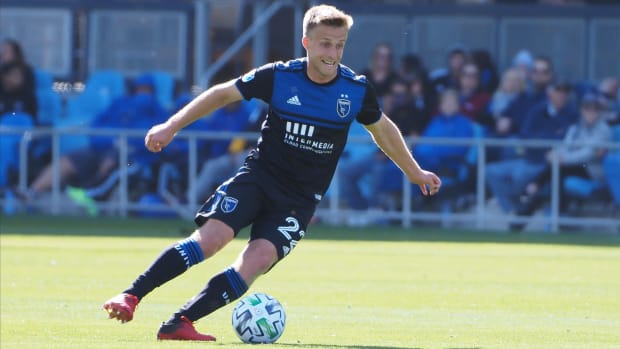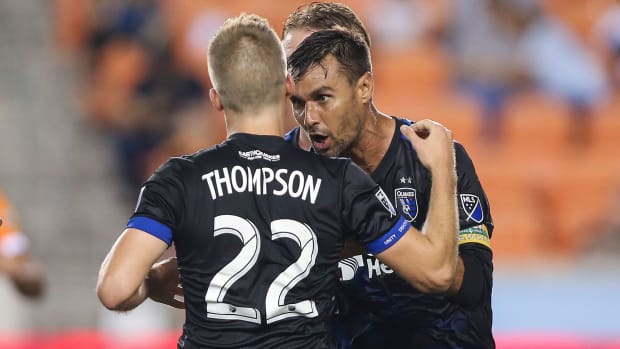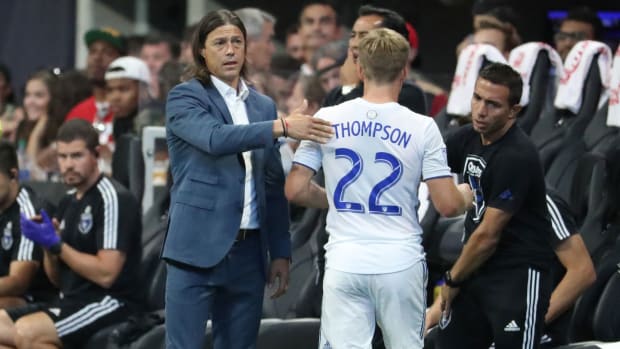New on Sports Illustrated: Tommy Thompson's Second Language May Be His Most Important One
The San Jose Earthquakes defender is versatile in more ways than one, and he's gone to great lengths to bridge a language gap at his club, immersing himself in Spanish to prove a very valuable point.
Last month, as most of the United States braced itself for the worst of the coronavirus pandemic, San Jose Earthquakes manager Matias Almeyda sent a group message to his team for some routine updates and training information. This was nothing out of the ordinary. Since the outbreak, Almeyda has made it a point to continue constant communication with his staff and players. What was different this time around, though, is that Almeyda’s messages were all in English with no help from his translator. The Argentine manager, who has needed a translator for most of his time with the Earthquakes since arriving from Chivas de Guadalajara in 2018, decided to intensify his English lessons during the outbreak.
At the sight of these messages, one of his players, Tommy Thompson, sent one back.
“I wanted to congratulate him on the progress, because I was really impressed,” said the 24-year-old Illinois native, who really admired the amount of work Almeyda had put in toward learning the language.
“Then straightaway, he messaged me right back with an idea," Thompson continued. "He wanted to us to do a Q&A session on Instagram Live, where he asked me questions in English and I answer them in Spanish. No script ahead of time. Nothing. So, we did it a few days later.”
The event was a success, as nearly 10,000 people watched. A majority of those watching were even more impressed at something Almeyda already knew, that Thompson’s Spanish was fluent. That impressive feat was actually part of the reason his manager felt so inspired to accelerate his own second-language quest and co-host this event.
But something even more outstanding is the story on why Thompson started taking Spanish lessons, the amount of time it took to pick it up and, perhaps most importantly, the deeper meaning behind his mission.
**********

When
Almeyda arrived in San Jose, the club had just ended one of its worst campaigns in its history. The Quakes ended the regular season at the bottom of the Western Conference with the fewest points (21) and wins (four) and conceded 71 goals (which would have tied Minnesota for a new league record for futility if Orlando City hadn't done worse by leaking 74 during the same season).The club quite simply needed a change. But it was more than numbers. The change needed was systematic. It was cultural.
Thompson, who has called the club his home since signing a Homegrown contract in 2014, saw the same thing. He and his teammates were down. Not fully beaten, but with one knee on the canvas and running out of answers.
Then the day arrived when he met Almeyda for the first time.
“Matias came in at the very end of that season before entering the offseason and he came into the locker room,” Thompson recalls. “Through a translator he said that he had watched every single game that year, looked at us honestly and said, 'I know that you guys are a lot better than you showed, and we’re going to change that. We’re going to do it with the same group, and we will improve.'"
Thompson stood there hanging to every word, mesmerized and equally perplexed by this man.
“In that moment, and how we performed that season, it sounded crazy to me–to have a coach come in from a different country and trust the group that he had," Thompson said. "It was amazing for me to see, and I was curious how it was going to play out.”
Almeyda maintained this message, and for Thompson, the cathartic moment arrived last year in Cancun, when the Earthquakes embarked on a two-week preseason training camp. That’s when Almeyda began his mission to change the dynamic between player and coach, and it would begin with daily conversations. Every morning, before training, the manager would sit with the players and just talk to them, but these chats, as Thompson explains, weren't about practice or the day’s schedule.
“Matias would sit on a soccer ball and would just simply talk to us as human beings. He’d tell anecdotes of him as a player, then as a coach and how he navigated the professional soccer world, because he wanted us to remember it can be a difficult world sometimes,” Thompson said. “And for a manager to talk to me like this and me, in turn, to witness it first-hand was amazing. I mean he would talk to us for 30 to 40 minutes before training, and normally when a coach talks for that long, guys would check out. But when Matias talked, even through a translator, nobody checked out. Everyone was completely locked in, and that’s when it was obvious to me, he was going to do something different.”
Almeyda’s conversations essentially centered on his most important goal: to work together as a united family, not as a mandate, but rather out of desire. Training, according to Thompson, would become the hardest he had ever experienced, but it was weirdly an enjoyable experience, and he wanted to show his manager and his team that he was all in. Thompson eventually won the club's fitness test and felt great physically, but he wanted to do more to amplify Almeyda’s message of togetherness.
“I just found a coach that our organization needed, and I wanted to support him and help him flip the switch. I wanted to be a part of his change and to help anyway I can.” he said. “So basically, I asked myself, ‘How can I help?’ From a performance standpoint I really wanted to be ready, but then on top of that I thought I could do something with our locker room, which had a lot of different cultures. I thought I could maybe learn Spanish to help bridge the gap between the guys who didn’t speak it or those who didn’t speak English. My idea was to be the bridge that could help anyone get along.”
Before moving forward, there’s something that needs to be known about Thompson. He is a unique personality. Spanish may not be in his blood, but soccer is. His father, Gregg, was a former U.S. national team defender and Olympian, played in the NASL and Major Indoor Soccer League and scored an NCAA title-winning goal in the eighth overtime of the 1982 final vs. Duke. But the younger Thompson's interests and ventures go beyond his soccer pedigree. He plays the piano, hosts YouTube coaching sessions, partners with Oakland's Soccer Without Borders program and has even collaborated with the Harlem Globetrotters (he insists his viral trick shot at the Chase Center is 100% real and only took a few attempts).
That's an impressive résumé for anyone, but for a 24-year-old, it speaks volumes.
And it’s because of his hunger to seek out different challenges that his idea of learning Spanish in order to help the team turned into an obsession in Cancun.
After training, he would spend between two and three hours a day inside his hotel room learning Spanish by using Duolingo, the language-learning website and mobile app. He would constantly practice his vocabulary to the point that his then-roommate, Chris Wondolowski, began to take serious notice.

“I thought it was a really impressive thing when he decided to go all in on it,” Wondolowski said. “At the beginning, it was funny and awesome at the same time. The guys would sometimes joke around because all they would hear is TT asking questions and using Duolingo, but then, I was just in awe of watching him learn a new language. That time in Mexico for preseason, he would go up to any Spanish speaker that was around and just ask them questions. That’s the thing about TT. When he sets himself on doing something, he fully immerses himself. Always ready to improve, whether it's Spanish or soccer, he's always so honest and willing about it.”
A week after returning from Cancun, San Jose headed to L.A. for a preseason match against LAFC. The team was taking shape, and Almeyda’s message looked like it was getting through. The team looked united, organized and hungry. And for Thompson–who had never even taken AP Spanish in high school and entered with essentially a blank slate–he was fluently speaking a second language. Now was the time to surprise his manager and teammates.
The story goes like this: It was February of 2019, the night before the LAFC game, and the Quakes were having dinner at their hotel in downtown L.A. Thompson, who had already left the dining room, returned because he wanted dessert. He proceeded to join Almeyda’s table, and upon hearing that the conversation was in Spanish, Thompson joined in. Almeyda looked surprised. “You speak good Spanish, Tommy! When did you learn?”
“Thanks! I learned it in Cancun.”
“When did you go to Cancun?” asked Almeyda, not realizing Thompson was talking about preseason.
“Last week!”
Almeyda’s jaw dropped and everyone started laughing and applauding. His Panamanian teammates, Aníbal Godoy and Harold Cummings, were amazed.
“Their reaction is something I’ll never forget," Thompson said. "Here were players who I have never spoken Spanish with, and suddenly we come back from Cancun in 2019 and the improvement was very noticeable. Harold would come up to me and say in Spanish, ‘What happened? Last year no Spanish and now this year Spanish?' They would die of laughter.”
As Thompson continued with his Spanish, the bridge between the Spanish-speaking and English-speaking players was getting tighter. Wondolowski noticed, and he knew it was all because of this spark, which was lit by Almeyda’s introduction and developed by Thompson’s self-imposed Spanish project.
“He set the bar for the team," Wondolowski said. "Spanish and English speakers in the team took notice and funnily enough, he’s given himself a leadership role because of it. He now has a unique ability to mix himself in different worlds and we can all see that. We've had some tough times, but you can see a brotherhood, a unity and how much we want to help each other. Almeyda really implemented that and gave us that light, and it's awesome to be a part of that.”
**********

Despite missing the playoffs in 2019, San Jose's changes were helping. With mostly the same roster, Almeyda helped improve the team to the tune of 13 wins and 44 points, and the Quakes missed out on the postseason on the final day of the regular season after a 3-1 loss to the Portland Timbers (which capped a season-ending six-game losing streak). When you take into consideration what had happened the year prior, this still represented a positive trajectory.
As for Thompson, he had his best season as he transitioned from midfield to defense under Almeyda’s tactical guidance, playing 30 matches more than 2,200 minutes. This year, before the outbreak suspended the MLS season indefinitely, he started both games.
During the pandemic, at a time when teams are physically removed from each other, Thompson has taken the time to refine his skills–all of them. It's been an opportunity to further expand his repertoire.
“It’s tough right now, as we’re not with our teams, everyone is away from their team, it’s tough. But instead of looking at this as an obstacle, I hope we can see this as an opportunity to write your own curriculum. Whether it’s football, basketball or whatever,” says Thompson, whose YouTube coaching sessions reached 100,000 views earlier this month. “For me it’s about focusing on self improvement and getting a little bit better everyday on your own, because once you come back into a team environment, now you have both.
“If young athletes come out of this better than when they came in because of the work they put in, and to continue that knowledge when they’re back with their teams, it’s a great opportunity.”
Thompson is still working every day on his Spanish by talking to locals and expanding his reggaeton knowledge (he loves Bad Bunny), and his journey resonates within the cultural landscape of U.S. soccer. His point is not just to learn a language in order to impress, but rather to celebrate the strengths of multiple cultures blending together.
“This whole situation has completely opened my mind that under American or European coaches that spoke English, we didn’t perform as well as we did last year," Thompson said. "So, for Matias to come in, despite having the language barrier, shows that despite any cultural differences, someone can come in and have a massive positive impact. Because I had no idea how it was all going to go when he came. I didn't know if he was going to play me. I didn’t even know if I was going to be done with the Earthquakes.
"But this whole experience of everyone trying to meet in the middle somewhere taught me that it took a coach from Argentina to come to America for me to have the best year in my career, and that to me is an amazing message. Because I've had so many American coaches and they didn't get the best out of me, and it was Matias from Argentina that helped me show what I can do. So, my message is simple: The best opportunities can come from places where you never expected, and if you do everything you can to try and meet as many people in the middle regardless of their background, amazing things can come from it.”

Comments
Post a Comment